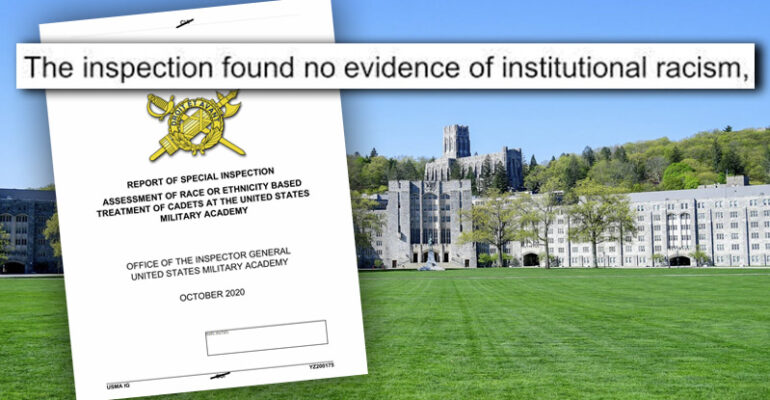USMA IG Report Finds No Evidence of Institutional Racism at West Point
13 October 2023 2024-01-24 15:34USMA IG Report Finds No Evidence of Institutional Racism at West Point
A FOIA request from 2021 for West Point has provided “The Report of Special Inspection Assessment of Race or Ethnicity Based Treatment of Cadets at the United States Military Academy” by the Office of the Inspector General, USMA and dated October 2020.
As background, during 2020 graduation week, several Black Cadets in the 2020 graduating class raised concerns on the state of racism within the Corps of Cadets to the Superintendent.
Shortly following Graduation, a group of nine graduates wrote a paper titled “An Anti-Racist West Point,” and sent this paper to The Secretary of the Army, Chief of Staff of the Army and USMA leadership.
Within days of its distribution, the paper circulated on several social media outlets, including Twitter, Linkedin and Facebook. Some alumni praised the recommendations in the paper, while others decried the effort as an inaccurate assessment of the state of the Academy.
In July 2020, USMA Superintendent LTG Darryl Williams directed the Inspector General Office to conduct a special inspection following this complaints of racial misconduct at West Point.
In the report’s Executive Summary of the 86-page document, the inspector found:
- There are no structural barriers to reporting EO complaints
- There are inaccurate perceptions about handling of misconduct, discipline and honor cases for minority Cadets
- Black Cadets tend to earn lower Military Development grades than their White counterparts
- There was no evidence found of institutional racism
Read report:
Initial Analysis
This information, regrettably, is additive to what we know about relative performance of cadets by racial category. That subject is unfortunately made relevant by USMA’s longstanding – and continued – use of racial preferences in the admissions process, its disingenuous claim (seeking exemption from adherence to constitutional equal protection) that racial preferences are a “national security imperative,” and its failure to acknowledge the total cost of such practice.
These findings give additional support to the conclusion that use of racial preferences in admissions comes at considerable cost, including the cost involved in dealing with disciplinary problems, and, significantly, the lowered quality of graduates as measured by their Military Development grade.
It also comes as no surprise, given that other information indisputably shows that as a group, some members of certain minority groups are admitted using lower (significantly lower, in some cases) standards than are Whites in pursuit of race-based “Class Composition Goals.”
A primary focus of VFM’s efforts has been to identify data/information that would show the consequences of the use of certain minority preferences in SA admissions.
The data unearthed thus far show that at USMA, African Americans and Hispanics, as a group (there are of course exceptions), enter with lower composite scores (Whole Candidate Scores, not just standardized test scores), at the expense of whites who have significantly higher composite scores but who are rejected; they – the preferenced minorities – have higher attrition rates, lower graduation rates, and lower GPA if they do graduate.
There is also data (the USMA 2015 RAND study report) showing that the composite score is a statistically significant predictor of success as a cadet (graduation and GPA) and as an officer.
Now, any objective review must consider also that the USMA IG found that “Black cadets tend to earn lower Military Department (MD) grades than their White counterparts” and that “minority cadets do account for a higher proportion of disciplinary infractions.”
So, USMA continues, by using racial preferences – i.e., lower admission standards for African Americans and Hispanics (yes, they are still doing so now) in pursuit of race-based “Class Composition Goals,” lowering quality of the overall graduating class.
These USMA IG findings (if the report’s contents support the Executive Summary) should be included in the evidence considered by Congress or any court when DoD argues that considering race (racial preferences) in SA admissions is a “national security imperative.”
DoD’s claim to such effect is not only untrue, it is the opposite of the truth. Racial preferences lower leader quality. The evidence against DoD’s position continues to mount.
Claude M. McQuarrie III
President, Veterans for Fairness and Merit



















